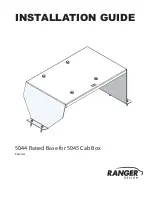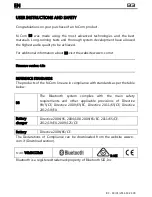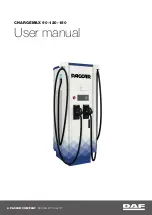
Black plate (133,1)
NOTE
l
After adjusting the tire air pressures,
it may require some time for the
TPMS warning light to go out. If the
TPMS warning light remains
illuminated, drive the vehicle at a
speed of at least 25 km/h (16 mph)
for 10 minutes, and then verify that it
goes out.
l
Tires can loose a little air quite
naturally over time and the TPMS
cannot tell if the tires are getting too
soft over time or you have a flat.
However, when you find one low tire
in a set of four - that is an indication
of trouble; you should have someone
drive the vehicle slowly forward so
you can inspect any low tire for cuts
and any metal sticking through tread
or sidewall. Put a few drops of water
in the valve stem to see if it bubbles
indicating a bad valve. Leaks need to
be addressed by more than simply
refilling the trouble tire as leaks are
dangerous - take it to an Authorized
Mazda Dealer which has all the
equipment to fix tires, TPMS
systems and order the best
replacement tire for your vehicle.
If the warning light illuminates again even
after the tire pressures are adjusted, there
may be a tire puncture. Replace the
punctured tire with the temporary spare
tire (page 7-6).
NOTE
A tire pressure sensor is not installed to
the temporary spare tire. The warning
light will flash continuously while the
temporary spare tire is being used.
Warning light flashes
When the warning light flashes, there may
be a system malfunction. Consult an
Authorized Mazda Dealer.
q
System Error Activation
When the warning light flashes, there may
be a system malfunction. Consult an
Authorized Mazda Dealer.
A system error activation may occur in
the following cases:
l
When there is equipment or a device
near the vehicle using the same radio
frequency as that of the tire pressure
sensors.
l
When a large metallic object (e.g. a
large electric household appliance or a
desk-top computer) is placed on the
right side of the rear seat, which may
block radio signals from the tire
pressure sensor to the receiver unit.
l
When using the following devices in
the vehicle that may cause radio
interference with the receiver unit.
l
A digital device such as a personal
computer.
l
A current converter device such as a
DC-AC converter.
l
When excess snow or ice adheres to
the vehicle, especially around the
wheels.
l
When the tire pressure sensor batteries
are exhausted.
l
When using a wheel with no tire
pressure sensor installed.
l
When using tires with steel wire
reinforcement in the side walls.
l
When using tire chains.
Driving Your Mazda
Starting and Driving
5-25
Mazda5_8W75-EA-06J_Edition1 Page133
Thursday, October 12 2006 5:10 PM
Form No.8W75-EA-06J
Summary of Contents for 5 2007
Page 1: ......
Page 2: ......
Page 6: ......
Page 12: ...1 6...
Page 96: ...3 28...
Page 197: ...MEMO 6 33...
Page 248: ...7 24...
Page 306: ...8 58...
Page 351: ...qTire Pressure Label qEngine Number Forward Identification Numbers 10 3...
Page 356: ...10 8...
Page 357: ...11 Index 11 1...
















































